You might deal with more headaches than regular landlords, such as managing bookings, tracking cleaning fees, seasonal pricing, and last-minute cancellations. On top of that, you've got to keep your finances straight, or you can end up in a tax nightmare.
That's where vacation rental accounting software comes in. It helps you track income, expenses, and taxes automatically, so you don't have to spend hours sorting through spreadsheets.
In this article, we'll review the best vacation rental accounting software for 2025, their pricing and features, and what makes each option great. Let's get started.
Key takeaways
- Vacation rental accounting is more complex than long-term rentals, requiring tracking of bookings, fees, seasonal pricing, and taxes.
- Manual data entry leads to errors in 88% of spreadsheets, increasing the risk of financial miscalculations.
- Good accounting software integrates with Airbnb, Vrbo, PayPal, and QuickBooks.
- Even small-scale owners can benefit from vacation rental accounting software.
- Baselane is an all-in-one solution that combines banking, accounting, and reporting without extra fees.
Why vacation rental accounting software matters in 2025
If expenses, taxes, or income aren't properly managed, they can seriously hurt your vacation rental business. Here are the reasons why you should manage your vacation rental property using accounting software:
Multiple booking platforms
Vacation rental owners aren't relying on just one platform anymore. As of 2024, 28% of property managers have expanded to multiple booking channels (Airbnb, VRBO, direct bookings, etc.).
More platforms mean more financial complexity—different payout schedules, varying fees, and multiple tax rules. Good accounting software helps you keep everything in one place so you don't lose track of where your money comes from.
Variable pricing and seasonal adjustments
Many property owners charge higher rates during peak seasons when demand is high and offer discounts during slower months to attract budget-conscious travelers.
Good vacation rental accounting software helps track fluctuating rates, promotions, and last-minute discounts.
Local and state regulations
Short-term rental laws vary by location, and occupancy tax compliance is one of the biggest challenges. Many cities and states require vacation rental owners to collect and remit taxes, but the rates and rules can change depending on your property.
A solid Airbnb accounting system simplifies automatically tracking occupancy taxes and keeps records for tax season. For example, Baselane, a property management software for landlords, provides a downloadable tax package with an income statement, transaction ledger, and captured receipts.
Complex expense tracking
Unlike traditional rentals, short-term rental owners deal with more frequent costs that can quickly add up.
Some everyday expenses include:
- Cleaning fees
- Maintenance and repairs
- Utilities
- Supplies
- Marketing and listing fees
- Property management services
- Insurance and permits
With so many moving parts, vacation rental accounting software helps track and categorize expenses automatically.
Property-specific profitability analysis
Vacation rental accounting software can track profitability on a per-property basis. It can highlight trends like:
- Which properties have the highest occupancy rates
- How seasonal fluctuations impact revenue
- Which listings have the highest operating costs
- Where pricing adjustments could improve margins
Spreadsheets vs. vacation rental property accounting software
Some landlords start with a free rental property Excel spreadsheet to track income and expenses, but managing spreadsheets becomes inefficient as properties grow.
Automation vs. manual entry
- Software: Automates accounting tasks, reducing manual workload and letting owners focus on guest experience and business growth.
- Spreadsheets: Require manual data entry, increasing time spent tracking income, expenses, and taxes. Instead of relying on a rent ledger template, landlords can use software that automatically tracks rent payments and expenses.
Accuracy
- Software: Reduces errors by automating calculations and syncing transactions in real-time.
- Spreadsheets: About 88% contain input mistakes due to manual data entry, increasing the risk of financial miscalculations.
Scalability
- Software: Keeps finances organized from day one, whether managing one property or scaling to multiple rentals.
- Spreadsheets: Might work for one or two properties, but quickly become overwhelming with various booking platforms, fluctuating pricing, and taxes.
Tax management
- Software: Automatically tracks deductible expenses like cleaning fees, utilities, and depreciation, making tax prep easier.
- Spreadsheets: Require owners to manually log deductions, increasing the risk of missing tax-saving opportunities.
Reporting and insights
- Software: Provides data-driven insights to help owners understand profitability trends and adjust pricing strategies.
- Spreadsheets: Only display raw income and expense data, requiring manual analysis to find patterns.
Payment tracking
- Software: Automatically tracks payments from multiple platforms, syncing with bank accounts and booking systems.
- Spreadsheets: Require manual logging of every transaction, increasing the risk of missed or duplicated entries.
Understanding property management payment systems
Property management payment software and platforms are designed to digitize and automate the financial transactions involved in managing rental properties. These systems can be standalone rent collection tools, integrated modules within comprehensive property management software, or specialized payment processing property management services.
They serve as a centralized property management payment hub, facilitating the flow of funds from tenants to landlords and providing essential tracking and reporting capabilities. Landlords looking for landlord property manager software will find that payment processing is a core function.
Key tenant-facing payment features explained
Effective property management payment solutions prioritize a smooth, transparent, and convenient payment experience for tenants. This encourages timely payments and improves tenant satisfaction.
Online rent payment options
These solutions allow tenants to pay rent electronically. ACH (Automated Clearing House) transfers are bank-to-bank payments, often free or low-cost, typically taking 2-5 business days. Debit and credit card options provide instant payment, though they usually incur processing fees, often paid by the tenant or landlord. Offering multiple options caters to different tenant preferences and financial situations.
Automatic recurring rent payments
Tenants can set up automatic deductions from their bank account or card on their due date. This feature is highly valued by tenants for its convenience and ensures rent is never missed. It provides a consistent income flow for landlords.
Partial rent payment setup
While landlords typically prefer full payments, some systems allow for partial payments with clear tracking. This feature requires careful configuration and clear policies to avoid confusion or lease violations, but can offer flexibility in certain situations.
Mobile payment access
A mobile-responsive design or dedicated app allows tenants to make payments, view history, and set up recurring payments directly from their smartphones. This is crucial in today's mobile-first world and is a highly requested feature.
Tenant payment portal/dashboard
A secure online portal acts as a central hub for tenants. Here, they can view current charges, make payments, see upcoming due dates, manage payment methods, and access their full payment history and receipts.
Email/SMS payment reminders
Automated reminders sent via email or text message before the due date significantly reduce late payments. Customizable timing ensures tenants receive prompts when they are most effective.
Access to payment history and receipts
Tenants can instantly access and download records of past payments and receipts from their portal. This provides transparency and serves as proof of payment, reducing tenant inquiries and disputes.
Easy security deposit payments
Streamlining the security deposit payment process during tenant onboarding makes move-in simpler. Tenants can pay the security deposit and first month's rent together electronically.
Refund processing visibility
If a refund is due to a tenant (e.g., for a security deposit return), the system should ideally provide the tenant visibility into the refund status or process, ensuring clarity and trust.
These tenant-facing features are key selling points when presenting online payment options to residents. A positive tenant experience with payments contributes to longer tenancies and better landlord-tenant relationships.
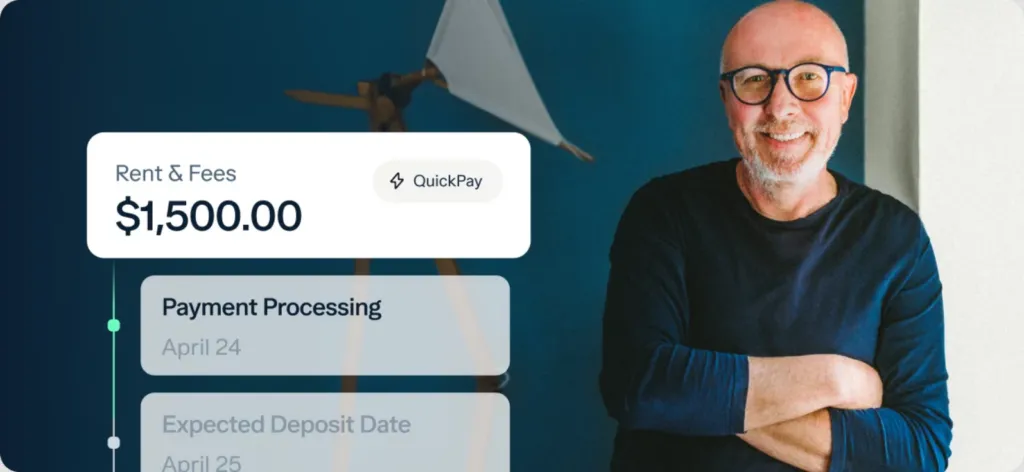
Integrations
- Software: Baselane and other vacation rental platforms integrate seamlessly with Airbnb, Vrbo, PayPal, Cash App, Xero, and QuickBooks.
- Spreadsheets: Offer limited integrations, mainly through CSV imports that require manual updates.
User access and collaboration
- Software: Allows multiple users with permission controls, real-time tracking, and cloud-based access.
- Spreadsheets: Require manual file sharing, leading to version control issues and accidental data edits.
Compliance and security
- Software: Uses bank-level encryption, audit logs, automated backups, and two-factor authentication (2FA) for secure access.
- Spreadsheets: May not have built-in encryption and fraud protection. Increased the risk of data loss or unauthorized changes.
Professional appearance
- Software: Generates professional invoices, statements, and financial reports, enhancing credibility with tenants, contractors, and tax authorities.
- Spreadsheets: Require manual formatting for invoices and reports, which can look inconsistent and less professional.
Cost vs. value
- Software: Comes with a monthly or annual fee, but the time saved, accuracy, and automation offset the cost. Vacation rental managers should allocate 5-10% of their revenue to property management.
- Spreadsheets: Free or low-cost, but require significant manual effort, increasing the risk of financial mistakes and inefficiencies.
Who should use accounting software for vacation rentals?
Selecting the ideal centralized property management payment system requires careful consideration of your specific needs. Landlords managing multi-family property management software or property management software for small landlords will have different priorities.
Key factors to evaluate include:
- Cost: Understand the fee structure – are there monthly fees for the software, transaction fees for ACH or card payments (and who pays them), or fees for features like reminders?
- Feature Set: Does the solution offer the essential tenant-facing and landlord-facing features discussed above that are critical for your operation?
- Ease of use: Is the platform intuitive for both landlords and tenants? Adoption relies on a user-friendly interface.
- Integrations: Does it integrate with your existing bank accounts and preferred accounting software? Solutions that include banking can simplify reconciliation.
- Security: What security measures are in place to protect financial data for both landlords and tenants?
- Customer support: What level of support is available if issues arise with payments or the platform?
Look for a property management automated payments solution that provides a comprehensive suite of tools, from payment processing to integrated banking and bookkeeping, to truly streamline operations. A software for property management with robust online payment capabilities is a significant investment in efficiency.
Implementing online payments: Best practices for landlords
The need for accounting software depends on portfolio size, but even small-scale vacation rental owners can benefit from automation.
Small portfolio (1-2 properties)
Most vacation rental owners fall into this category. They typically self-manage their properties without employees or property managers.
While spreadsheets may seem sufficient, tracking even a single property can become difficult with seasonal pricing, multiple booking channels, and tax deductions. The software helps automate finances and save time.
Recommendation: Software is optional but useful for staying organized and reducing manual work.
Medium portfolio (3-10 properties)
With multiple properties, finances become significantly more complex. Owners must track income from different sources, account for variable expenses, and ensure tax compliance across multiple locations.
At this stage, managing everything with spreadsheets becomes inefficient and increases the risk of errors. Accounting software helps automate reporting, integrates with booking platforms, and provides a clear financial overview.
Recommendation: Software is highly recommended to improve efficiency, accuracy, and scalability.
Large portfolio (10+ properties)
Large portfolios, anything above 10 properties, almost always need accounting software for vacation rentals. The complexity of managing so many listings, fees, and taxes makes manual tracking nearly impossible without wasting a lot of time.
Recommendation: Software is essential for managing a large portfolio efficiently and staying financially organized.
Essential features to look for in vacation rental accounting software
Here are the key features that make accounting software helpful for vacation rental owners.
Automated bookkeeping
Most small and medium-sized landlords can't afford a bookkeeper, so they're stuck managing the numbers. That's fine—until it starts eating up hours of your time.
Managing vacation rentals is time-consuming, especially as your portfolio grows. Some owners, like Kerri Gibson, who oversees six short-term rental properties, spend around 50 hours per week running their hospitality business.
Revenue management
Vacation rental income isn't as predictable as long-term rentals. Rates change based on seasonality, demand, and competition. A good vacation rental accounting software helps you stay ahead of these shifts. It lets you:
- Track revenue trends
- Integrate with dynamic pricing tools to automate pricing adjustments
- Forecast earnings based on past bookings and upcoming events
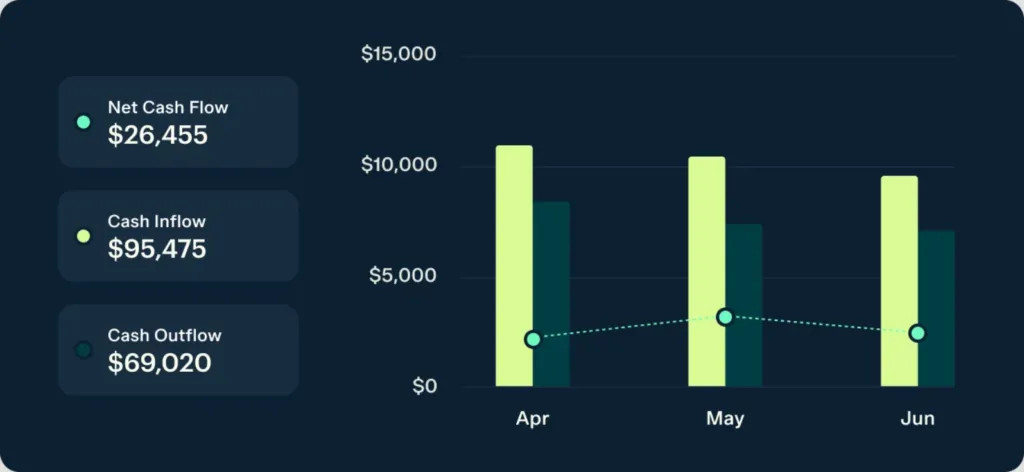
Expense tracking
Vacation rental property accounting software helps categorize and monitor every dollar spent. Software like Baselane offers 120+ real estate-specific income & expense categories.
It can connect with bank accounts and credit cards to automatically log expenses, reducing manual entry and improving accuracy.
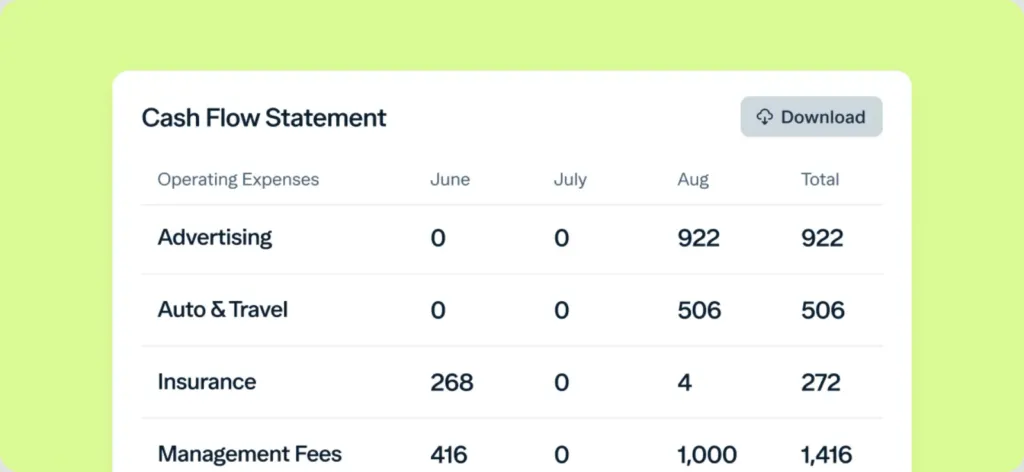
Booking platform connectivity
Vacation rental accounting software connects directly to Airbnb, Vrbo, and similar booking platforms. Instead of manual data entry, it automatically collects booking revenue, fees, and guest payments.
With real-time syncing, owners can see how much they earn from each platform and get a clear financial overview from a single dashboard.
Property management systems
Many short-term rental accounting software solutions go beyond bookkeeping by offering built-in property management features.
Key property management features include:
- Automated rent collection
- Automated payment reminders
- Maintenance tracking
- Security deposit management
- Task management
- Multi-property dashboards
- Banking tools
Tax preparation
Rental bookkeeping software simplifies tax season by automating financial tracking and organizing tax-ready reports. Owners can generate a Tax Package—a consolidated report of property financials that can be easily shared with tax preparers, lenders, or business partners.
Baselane's tax reports typically include:
- Net Operating Cash Flow Report: Summarizes rental income and expenses for accurate tax filing.
- Transaction Ledger: Provides a detailed record of all transactions, categorized for tax purposes.
- Schedule E Tagging: Some platforms allow transactions to be tagged under IRS Schedule E categories, helping owners maximize deductions.
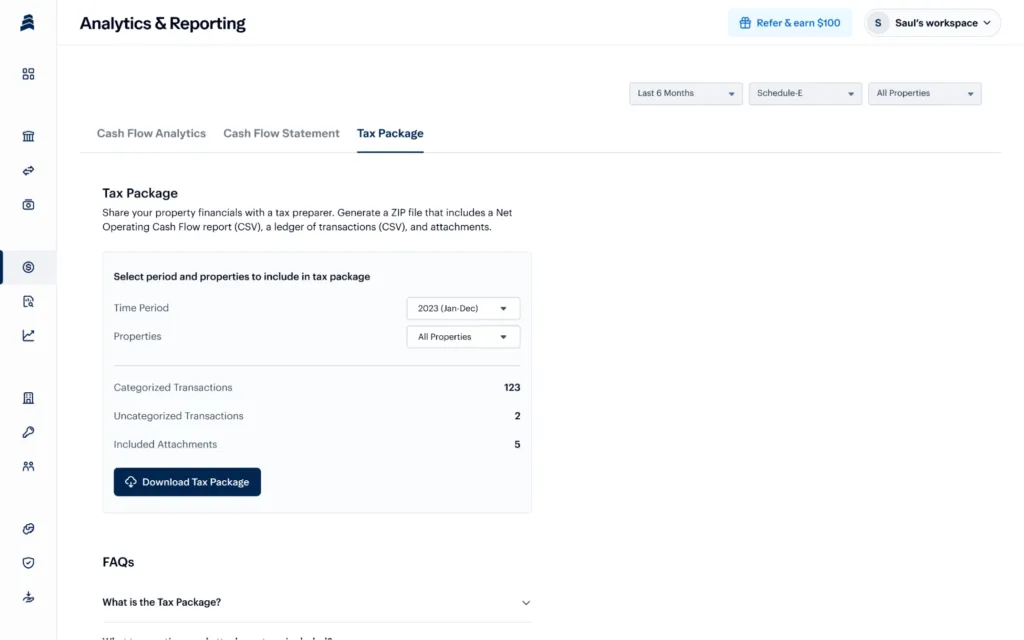
Performance analytics
Vacation rental accounting software provides real-time analytics to help owners understand how their properties are performing and where they can improve.
For example, Baselane is one of the best accounting software for rental properties that tracks five key performance metrics:
- Asset value & appreciation: Tracks property value over time using purchase price, current market value, and Zillow integration for accurate insights.
- Net operating income (NOI): Calculates total revenue minus operating expenses, showing the profitability of a rental before taxes and financing costs.
- Return on equity (ROE): Measures total return relative to owner equity, helping assess whether reinvesting profits or selling is the better financial move.
- Cash-on-cash return: Evaluates returns relative to the initial investment, factoring in pre-tax cash flow and upfront costs.
- Cap Rate: Compares rental income against property value, helping owners quickly assess their rental yield and market competitiveness.
Mobile accessibility
Vacation rental owners are always on the move, whether managing guest check-ins, handling maintenance, or traveling. Mobile-friendly accounting software lets owners track income, log expenses, and view reports from anywhere.
Access control
Vacation rental accounting software allows owners to grant controlled access to collaborators like accountants, property managers, or business partners.
Platforms like Baselane offer multi-user workspaces where owners can invite others and assign different access levels based on their roles. Owners can invite, manage, and remove collaborators as needed.
There are typically two levels of collaborator access:
- Standard (Full) access: Allows users to manage rent collection, bookkeeping, reporting, and banking functions (e.g., creating virtual accounts and viewing balances).
Limited access: Provides rent collection and bookkeeping access but restricts certain banking functions like moving money or creating virtual accounts.
9 Best vacation rental accounting and bookkeeping software platforms
Below are the top vacation rental accounting and bookkeeping software platforms.
1. Baselane
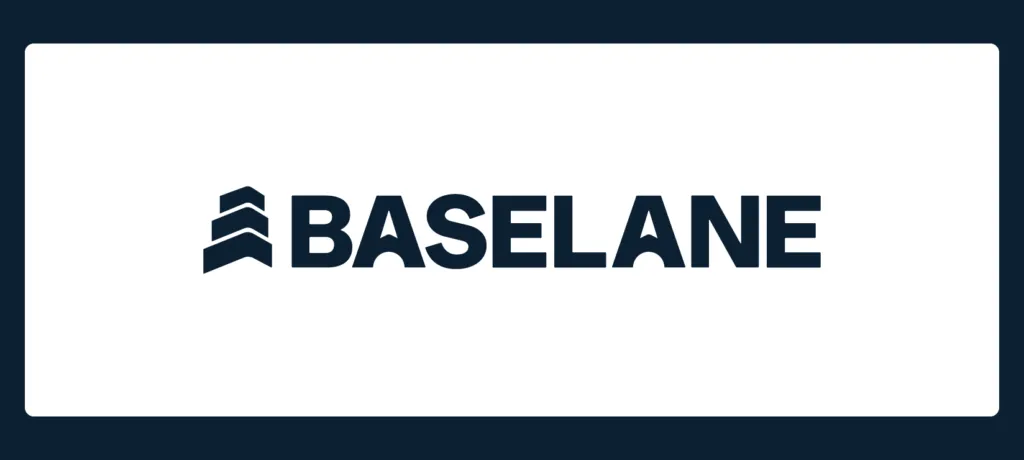
Best For: Ideal for vacation rental owners seeking an all-in-one platform that combines banking, accounting, rent collection, and financial analytics in a single dashboard.
Baselane is a property management platform with accounting and banking features for rental property owners, including vacation rental properties. Instead of juggling multiple apps for banking, bookkeeping, and rent collection, Baselane puts it all in one place.
Baselane automates bookkeeping for vacation rental properties. Every time money comes in or goes out, Baselane sorts it into categories for you. You can track cash flow in real-time, see profit and loss at a glance, and even pull reports that help with taxes. If you've ever lost receipts or spent hours figuring out Airbnb expenses, you know how valuable this is.
Baselane handles automated rent collection and reminders. It also lets guests pay online, so you don't have to chase them down. If you're running short-term rentals on Airbnb or Vrbo, Baselane can sync with your earnings and keep everything organized.
You can also open as many checking and savings accounts as you need, one for each property, one for repairs, and one for taxes.
Key features:
- Bookkeeping: Tracks income and expenses for each property. Saves time and keeps records accurate.
- Receipt upload: Snap a photo or upload receipts to keep all property-related expenses in one place. No more lost paperwork.
- Cash flow analytics: See real-time insights on rental income, expenses, and profits. Helps you make smarter financial decisions.
- Financial reports: Generate reports like profit and loss statements, making it easy to see how your rentals perform.
- Tax packages: Prepares tax-friendly reports, including Schedule E forms, so tax season is less of a headache.
- Collaborator access: Share financials with property managers, accountants, or business partners without giving full control.
- Maintenance management: Log repairs, track expenses, and keep up with maintenance requests to keep your rentals in top shape.
- Landlord insurance: Access coverage options designed for rental properties, protecting your investment.
- Rental property loans: Financing options to help you expand your portfolio or improve your current properties.
Pros:
- No monthly fees
- Faster payouts (2-5 business days)
- Multiple accounts of rental income are separate from personal finances
- Dedicated customer support
- Automated expense categorization
Cons:
- No mobile app (coming soon)
- No renter messaging on the platform (coming soon)
Pricing:
Baselane is free to sign up. There are no fees for account opening or return payments.
2. Clearing
Best for: Short-term rental managers needing bookkeeping and trust accounting solutions without full property management features.
Clearing is a financial management platform designed for short-term rental property managers. It provides bookkeeping and trust accounting solutions for vacation rental owners.
However, because Clearing focuses solely on accounting, it lacks other necessary property management features, such as automated rent collection, task management, or banking tools.
Key features:
- Expense management
- Custom owner statements
- No fees to invite your accountant
Pros:
- Allows segregation of funds by homeowner or property groups
- Extract reservation data from other platforms
- Different permission levels for accountants and other employees
Cons:
- Expensive for single property owners
- Steep learning curve
Pricing: Clearing offers custom pricing based on the number of properties and features needed. Starts with $92.50 per month for up to 10 listings + a one-time implementation fee of $199.00.
3. QuickBooks Online
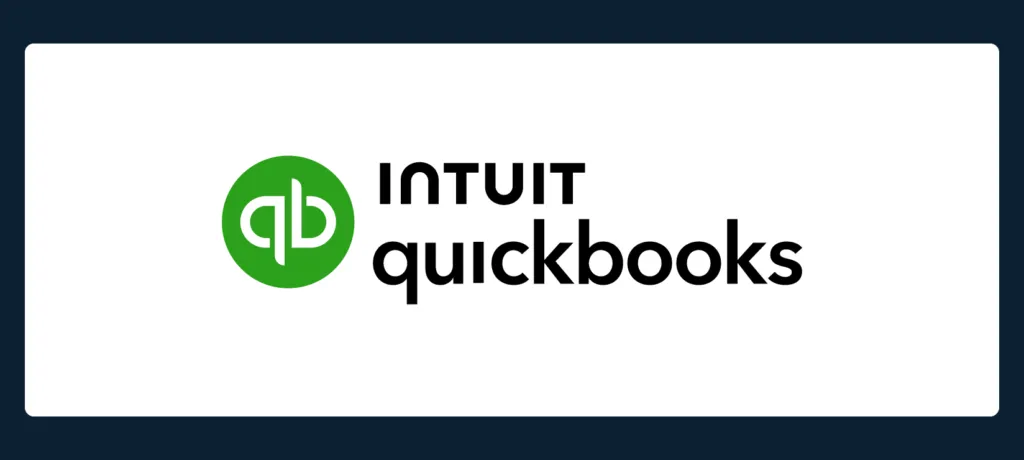
Best For: Small and medium-sized businesses that require general accounting tools but not rental-specific features.
QuickBooks is an accounting software developed by Intuit. It is designed to assist small and medium-sized businesses in managing their financial operations.
Although it offers accounting and bookkeeping tools, it is not ideally suited to managing rental property expenses. It lacks online rent collection, maintenance tracking, or security deposit accounts.
Key features:
- Invoicing and payroll processing
- Inventory management
- Bill management
Pros:
- Its intuitive design
- Add-ons for larger organizations
- Integrates with numerous third-party applications
Cons:
- Lacks vacation rental-specific tools
- It can be expensive for smaller rental businesses
Pricing: Depending on the features, monthly plans range between $3.50 and $23.50.
4. Xero
Best for: Business owners and self-employed individuals looking for accounting and financial reporting tools with broad integrations.
Xero is accounting software for small businesses and sole traders. The platform offers a range of reports, including profit and loss statements and balance sheets, which provide vacation rental owners with insights into their property's financial performance.
While Xero's reporting capabilities are comprehensive, they are not tailored specifically for property management. The platform lacks industry-specific reports like rent roll summaries, vacancy analyses, and maintenance tracking.
Key features:
- Online invoicing
- Pay bills
- Inventory tracking
Pros:
- Mobile app available
- An unlimited number of users
- Pay your real estate agents through the platform
Cons:
- Limited customization options for vacation rental businesses
- Does not provide a direct phone line for customer service
Pricing: The regular pricing for Xero plans is as follows:
- Early: $20 per month
- Growing: $47 per month
- Established: $80 per month
5. Sage Intacct
Best For: Companies that need financial management with customizable reporting and automation.
Sage Intacct is a financial management solution designed for accounting processes for businesses of varying sizes. The platform offers core financial modules, including accounts payable, accounts receivable, cash management, general ledger, and order management.
For landlords with small portfolios, Sage Intacct's extensive functionalities might be excessive, leading to underutilized features and an unjustifiable return on investment.
Key features:
- Payroll and HR management
- Cash flow management
- Collaboration tools
Pros:
- Reporting capabilities
- Customizable dashboards
- Phone support available
Cons:
- Implementation takes 3-6 months
- Complex setup
- Only annual subscription plans are available
Pricing: Personalized pricing plans based on the modules selected.
6. FreshBooks
Best for: Small businesses and freelancers who need invoicing, expense tracking, and financial reporting without property management tools.
FreshBooks is an accounting software service developed by 2ndSite Inc. It's a Quickbooks alternative primarily targeting small to medium-sized businesses. Users can create and send customized invoices, track expenses, manage accounts payable, and monitor billable time.
Key features:
- Mileage tracking app
- Client account portal
- Business health reports
Pros:
- User-friendly interface
- Mobile app available
- 30-day trial available
Cons:
- Each additional user incurs an extra fee of $11 per month
- Not suitable for large businesses
Pricing: The regular pricing for FreshBooks plans is:
- Lite: $10.50 per month
- Plus: $19 per month
- Premium: $32.50 per month
Custom pricing is also available for higher limits.
7. Hostfully
Best for: Vacation rental hosts who need property management tools, automation, and direct booking capabilities with limited accounting tools.
Hostfully is a vacation rental software platform that provides different property management features. Features include an inbox, automated messaging, and direct booking website capabilities.
Hostfully does not inherently offer advanced accounting functionalities. The platform's cost may also be expensive for starters.
Key features:
- Channel manager
- Direct booking website
- Pricing management
Pros:
- Mobile app available
- Offers customizable digital guidebooks (one guidebook in the free plan)
- Automated messaging
Cons:
- High subscription costs
- No phone support
Pricing:
- Starter: $117 per month (Up to 4 listings)
- Pro: $207 per month (Up to 11 listings)
- Pro Plus: $257 per month (Up to 19 listings)
Custom pricing will be charged for 20+ listings.
8. OwnerRez
Best for: Vacation rental property owners looking for management features with basic accounting tools, often paired with third-party software.
OwnerRez is a vacation rental management platform designed for property owners and managers. It helps with many property management tasks, such as renter agreements, reporting, and security deposit holds.
While OwnerRez includes accounting features, they are fairly basic compared to dedicated accounting software. Users may need third-party integrations to handle more complex bookkeeping and financial reporting.
Key features:
- Revenue management
- Portal access for vacation rentals
- Channel management
Pros:
- Use your own credit card processor
- QuickBooks integration available
- 14-day trial available
Cons:
- Does not offer direct phone support
- No dedicated mobile app
- Some users report that the platform's interface appears dated
Pricing: Starts at $40/month for one property.
9. Rentec Direct
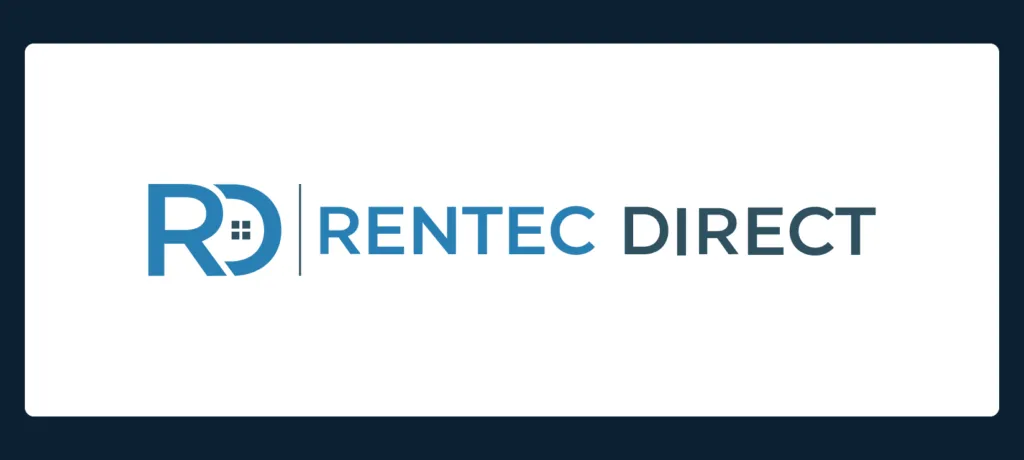
Best for: Landlords and property managers needing rental income tracking, expense management, and ledger-based reporting.
Rentec Direct is a property management software designed to help landlords and property managers track rental income, expenses, and tenant details. It allows users to review, edit, and print ledgers for properties, tenants, owners, and bank accounts.
Key features:
- Income and expense tracking
- Vacant property marketing
- Trust account management
Pros:
- Optional same-day ACH deposits ($0.50 per transaction)
- Mobile app available for landlords and tenants
- Synchronize data with Quickbooks
Cons:
- Some users found the user interface not as intuitive as they would prefer
- Expensive when scaling
Pricing: Pricing starts at $45 for Rentec Pro and $45 for Rentec PM (property managers), but depending on the number of units managed, costs can go over $5,625.
Compare vacation rental accounting software
Here is a comparison table of the best vacation rental accounting software.
Choosing the right vacation rental accounting software
What works for a small Airbnb host renting out a single unit might not be the best fit for someone managing 20 properties across multiple platforms.
Here's what to consider before making a decision:
Budget
Some platforms offer many accounting tools for free, while others charge $20–$200+ per month. Landlords should ask themselves: Will paid software save me enough time and effort to justify the cost? If a free platform already covers everything you need, there's no reason to pay extra.
Features and integrations
If you list on Airbnb, Vrbo, or Booking.com, your software should sync with these platforms to track payouts, fees, and taxes. Look for tools that integrate with banking, payment processors (PayPal, Stripe), and tax reporting tools. If your software can't pull data automatically, you'll spend more time manually entering transactions.
Ease of use
If software is complicated, you won't use it. A good platform should automate income tracking, categorize vacation rental expenses, and generate reports without extra steps. It might be a wrong choice if you need long-term training just to check profits.
Scalability
If you plan to expand from one property to several, your software should handle multiple units, separate finances per property, and support additional users like accountants or property managers. It should also cost reasonably as the number of units increases.
Landlords with growing portfolios need the best property tax management software to keep up with other state tax regulations.
Automate your accounting and maximize returns with Baselane
All you need is a system that checks your finances without extra work. One that automates bookkeeping, tracks expenses, syncs with Airbnb and Vrbo, and even makes tax season easier. Baselane makes that possible, without the extra fees.
If you're looking for an alternative to QuickBooks for landlords, Baselane offers a rental-focused solution that integrates banking and accounting in one place.
Sign up for Baselane today, it's easy to set up and built for property owners like you.
FAQs
What is the difference between vacation rental bookkeeping and accounting?
Bookkeeping is about recording daily transactions, tracking income and expenses, and categorizing financial data. Accounting for vacation rental properties goes further, analyzing those records to generate reports, calculate taxes, and assess profitability.
What is the best accounting program for rental properties?
The best software depends on your needs. Baselane is a top choice for vacation rental owners because it automates bookkeeping, tracks expenses, syncs with Airbnb and Vrbo, and helps with tax reporting, all for free.
How do you track revenue and expenses for vacation rentals?
Use accounting software that syncs with booking platforms and bank accounts to automate tracking. Baselane, for example, logs income, categorizes expenses, and generates reports, so you always know where your money is going.
















.jpg)